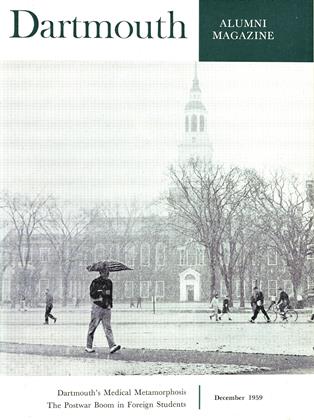Including aMeditation by Rosenstock-Huessy entitled"Biblionomics." New York: Four Wells,1959. 38 pp. $1.00
During the past two decades the teacher at Dartmouth has been a rarity who has not perceived in at least one of his students deep pedagogical markings of the mind of Eugen Rosenstock-Huessy. Few have been able to take him lightly. Some brought from him to their other academic commitments the attitudes of a roving discipleship. One measure of his influence upon these appeared in a smaller number who reacted against him with an exasperation almost as dedicated. What Rosenstock has taught, out of his deep belief, is properly open to challenge from all quarters. His power as a teacher, for the accepters and the rejectors alike, centered in his clearly declared impatience with the theory that the young mind can learn to conduct itself in controversy through amiable encouragements. He welcomed no challenges from those who had given the problem under discussion no adequate prior thought. Many consequently regarded him as a classroom martinet. Those who could get at least a toehold on common ground have come to know him, outside the classroom, as a patient friend, willing to argue up and down his deep meadow for hours, on or off a horse. This is still happening.
For a special reason I have found it surprising that so few of Rosenstock's colleagues are aware of the large bibliography of his writings prior to his move to America. I once had the task of overseeing the acquisition of his personal library by the College, and its integration into the stacks of Baker. The late Freda Harold, who handled the knowledgeable part of the task with the excellence which in her was commonplace, called to my notice almost daily for a year or two something written by or about Rosenstock, which she had turned up in the course of classifying the Rosenstock-Huessy collection. I got the habit of glancing at bibliographies of likely works in social and political theory, as they arrived in the order department, for evidence of Rosenstock's influence upon other writers. The result was both impressive and depressing. Foreign scholars, particularly in England, were making use of his Out of Revolution (I recall that E. H. Carr was one) but there was almost no sign of its influence in the new land to which he had brought his adventurous learning and his passion as a teacher.
This is a standard if lamentable experience of eminent men. I need not quote the dogeared adage. The other side of the story is rich enough, and the present volume bespeaks the rewards of devotion to the life of ideas which flower up from scholarship. Four of Rosenstock's students have prepared this bibliography of his writings: nearly 150 titles prior to 1935, and about 90 more since his move to America. A few commentaries upon his work by others are included. The range of his interest is phenomenal: in theology from ancient Egypt and China to The Christian Future; in philology from Greece to now, with a pause to work up a medieval Latin grammar; social, political, historical studies in many eras and places; a report for a montaineering journal, a piece on esthetics; studies of Spengler, of William James; above all, the monumental Out of Revolution: Autobiography of Western Man, published in 1938, and the more recent Soziologie issued in two volumes in Germany, 1956 and 1958.
The present volume includes two essays, "Biblionomics" by Rosenstock himself, and a biography of the author by Kurt Ballerstedt: summaries of his career from within and without that should not be further summarized. Professors Carl J. Friedrich of Harvard and Eduard Heimann of the New School supply a brief introduction containing this evaluation:
"There are very few contemporary thinkers of a first rank whose bibliographies would be of equal volume, but what really matters is that in no case can a complete bibliography be as desperately needed as with Rosenstock because the discrepancies between the more or less known and the inaccessible and forgotten parts of the total are so large."
This bibliography is, of course, incomplete: there is more to be written, and recorded in an appendix. The teeming mind that has been so busy at Four Wells cannot be slowed down by the mere suffix "Emeritus."
 View Full Issue
View Full Issue
More From This Issue
-
 Feature
FeatureDartmouth's Medical Metamorphosis
December 1959 -
 Feature
FeatureStudents from Abroad
December 1959 By J.B.F. -
 Feature
FeatureMary Baker Eddy and Dartmouth
December 1959 By JOHN B. STARR '61 -
 Feature
FeatureSTEFANSSON
December 1959 By ALAN COOKE '55 -
 Class Notes
Class Notes1921
December 1959 By JOHN HURD, LINCOLN H. WELD -
 Class Notes
Class Notes1918
December 1959 By THOMAS E. SHIRLEY, W. CURTIS GLOVER
ALEXANDER LAING '25
-
 Letters to the Editor
Letters to the EditorLetters
June 1940 -
 Books
BooksSAILING IN-THE STEREO-BOOK OF SHIPS,
December 1937 By Alexander Laing '25 -
 Books
BooksTHE FIVE HUNDRED HATS OF BARTHOLOMEW CUBBINS
January 1939 By Alexander Laing '25 -
 Books
BooksHORTON HATCHES THE EGG
December 1940 By Alexander Laing '25 -
 Article
ArticleVirtuous Pagan
January 1960 By ALEXANDER LAING '25 -
 Books
BooksASBESTOS PHOENIX.
DECEMBER 1968 By ALEXANDER LAING '25
Books
-
 Books
BooksTHE AUTOBIOGRAPHY OF EDWARD GIBBON.
July 1961 By HAROLD L. BOND '42 -
 Books
BooksBOUND FOR FREEDOM.
JUNE 1966 By HEINZ VALTIN -
 Books
BooksIdiocy and Fantasy
JAN./FEB. 1979 By J. D. O'HARA '53 -
 Books
BooksAMERICAN MILITARY GOVERNMENT IN KOREA
October 1951 By John W. Masland -
 Books
BooksALGEBRA FOR COLLEGE STUDENTS
May 1937 By Robin Robinson '24 -
 Books
BooksTUMOR SURGERY OF THE HEAD AND NECK.
May 1958 By WILLIAM T. MOSENTHAL '38, M.D.


